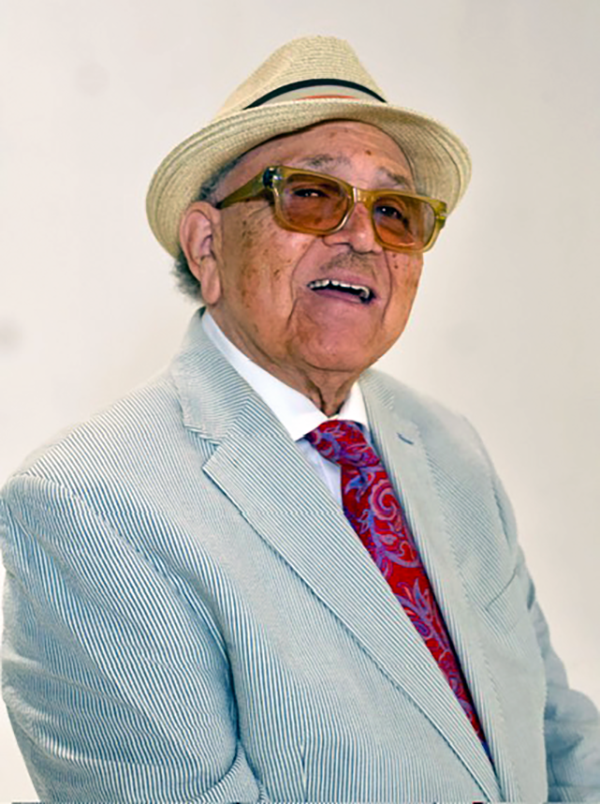UMB 2025 Honorary Degree Recipient: Ronald Chisom
May 07, 2025 Charles Schelle
Known as “Brother Ron,” the co-founder of the People’s Institute for Survival and Beyond has been a community organizer and advocate for social justice for more than 60 years.
Ronald Chisom will receive an Honorary Doctor of Public Service degree from the University of Maryland, Baltimore during 2025 graduation ceremonies the week of May 19. He was nominated by the University of Maryland School of Social Work.
Ronald Chisom has been a tireless advocate for social justice for more than 60 years. Affectionately known as “Brother Ron,” he co-founded the People’s Institute for Survival and Beyond (PISAB) and continues to travel the country facilitating his Undoing Racism Community Organizing workshop.
On May 19, Chisom will make a stop in Baltimore, not to deliver a lesson but to receive another laurel to add to his impressive list of accolades: an honorary Doctor of Public Service degree from the University of Maryland, Baltimore (UMB). Nominated for the award by the University of Maryland School of Social Work (UMSSW), Chisom will receive the honor during UMSSW’s 2025 Convocation at the Lyric Baltimore.
(Read more about Chisom and UMSSW’s Convocation.)
“At 83, Ron remains a vital force in antiracist organizing, mentoring new leaders and frequently visiting UMB to engage with our faculty, staff, students, and Baltimore community,” said UMSSW Dean Judy L. Postmus, PhD, ACSW. “His work exemplifies the values we hold dear: courage, compassion, and a steadfast commitment to justice.
“Bestowing this honorary degree on Brother Ron honors his extraordinary contributions and reaffirms UMB’s dedication to equity and the power of education as a tool for social change.”
“I’m very excited to receive this honor and to be part of the social work profession moving us toward social change,” Chisom said. “In the midst of these times, to be honored for ‘Undoing Racism’ speaks to the commitment of the University and the power of organizing. I’m appreciative of everyone who made this happen.”
Chisom’s journey began in New Orleans, where he organized tenants in public housing, successfully sued landlords to improve inhumane living conditions, and inspired communities to take collective action.
His landmark 1984 case against the Louisiana Supreme Court paved the way for the election of the state’s first Black Supreme Court justice, securing a legacy through the “Chisom Seat,” which remains a cornerstone of legal history.
In 1980, Chisom co-founded PISAB, creating a groundbreaking antiracism training model. The organization’s Undoing Racism workshop has since trained over 2 million individuals across the globe — from small towns in Alabama to urban centers in Tokyo and Johannesburg, South Africa — providing tools to dismantle systemic racism and foster meaningful change.
Matthew Shenoda, MFA, a writer, editor, and professor and chair of the Department of Literary Arts at Brown University, attested to the transformative power of Chisom’s workshops, saying they impacted him professional and personally.
“The workshops created a shared understanding and baseline for institutional change, equipping faculty and staff to take actionable steps toward becoming an antiracist educational institution,” Shenoda said.
Sherone Lewis, MA, director of special projects, Maryland Department of Health, and former behavioral health coordinator for Mid Shore Behavioral Health, Inc., in Easton, Md., said the Undoing Racism workshops challenged her “to acknowledge gatekeeper status and confront systemic racism within institutions.”
Chisom has served as a coach with the W.K. Kellogg Foundation, which advocates for racial equity and healing as a way to support community efforts to help children thrive, and received many prestigious awards, including the Ashoka Fellowship, Bannerman Fellowship, Thomas Merton Award, Petra Foundation Award, Pax Christi Bread & Roses Award, and Tenant Resource Center Achievement Award.
Postmus noted that Chisom’s life’s work exemplifies UMB’s core values set of Equity and Justice and that he has influenced millions of people around the globe as well as at UMSSW and UMB.
The dean added that Chisom’s work directly aligns with UMSSW’s mission and that his Undoing Racism principles have inspired the SHARP (Structural oppression, Historical trauma, Analysis of role, Reciprocity and mutuality, and Power) framework, which was developed by Wendy Shaia, EdD, MSW, clinical professor and executive director of the Center for Restorative Change. SHARP is now integrated into UMSSW’s curriculum, faculty development, and student learning experiences.
“Ron has changed our understanding — not just at UMB but also across the world — of what it means to be a leader and what it means to work with people who’ve experienced oppression,” said Shaia, who will hood Chisom at the UMSSW Convocation. “All of his work Ron credits right back to the communities that he has organized with.”